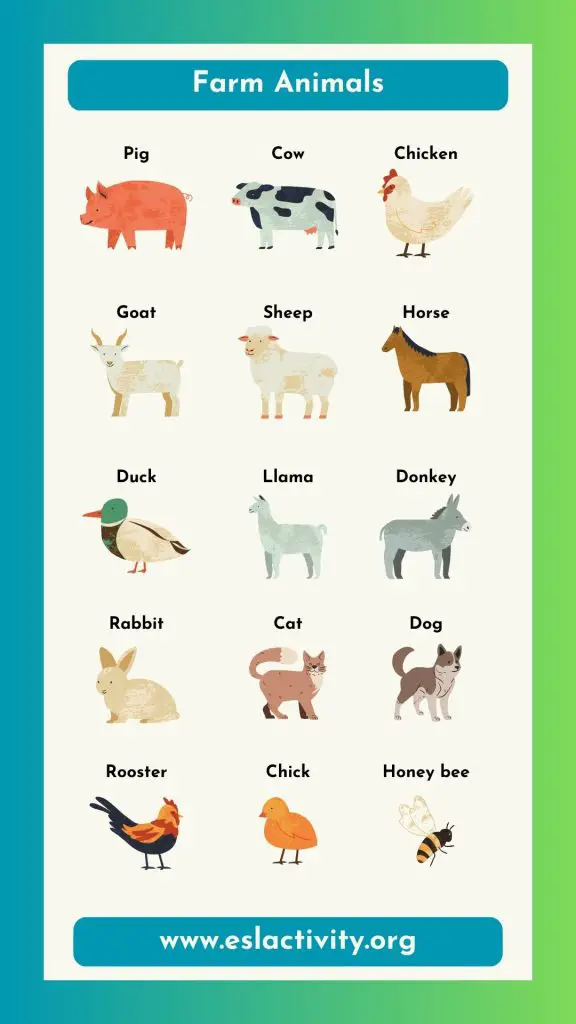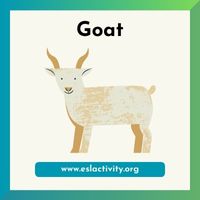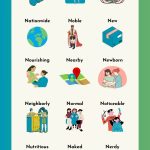Domestic animals are the type of animals that live closely with humans. People keep domestic animals for various reasons, including companionship, food, work, or agriculture. Do some of these reasons sound familiar? Yes, pets and farm animals are considered types of domestic animals.
People have domesticated animals for over 10,000 years. Some evidence suggests that people have domesticated dogs as far back as 20,000 to 40,000 years ago. Back then, people would have provided protection to the animals, and the animals would have helped with hunting and finding food. So, basically, they had a mutually beneficial relationship.
Humans and domestic animals have had a strong tie for a very long time, which, therefore, makes animals a very important topic in conversations. People love to talk about animals. If you are someone trying to improve your English, learning domestic animal names and related vocabulary will help your overall speaking, writing, and reading skills.

Domestic Animals vs. Wild Animals
You might be wondering how domestic animals differ from wild animals. Well, we can probably say that domestic animals were all once wild animals. However, more than 10,000 years ago, people decided to domesticate some of the wild animals for their benefit.
Definition of Domestic Animal
The term “domestic” is derived from the Latin word “domesticus,” which means belonging to the household. So, domestic animals refer to creatures that are selectively bred and adapted to live in close association with humans. These animals undergo “domestication” to be able to live with or for humans. Domestication is when wild animals are tamed, controlled, and bred to be better suited for living with humans and meeting their needs.
Differences between domestic animals and wild animals
Here are the main differences between domestic and wild animals.
Domestic animal:
- Selectively bred for human companionship or use.
- Tend to be more tolerant, docile, and trainable.
- Live in human-created environments like homes and farms.
- Dependent on humans for food, shelter, and care.
- May have lost some natural instincts and survival skills.
Wild Animal:
- Live in natural ecosystems.
- Exhibit behaviors essential for survival in the wild.
- Self-sufficient and reliant on natural instincts.
- Not selectively bred for human interaction.
- Follow natural reproductive patterns and behaviors.
Domestic Animals Names
Now, let’s go over the list of domestic animals’ names with pictures. We also have fun facts about each domestic animal.

Cat
Cats have a remarkable ability to land on their feet after falling due to a flexible backbone and lack of a collarbone, a phenomenon known as the “righting reflex.”

Chick
Chicks, or baby chickens, communicate with their mothers and siblings even before hatching by making soft clucking sounds inside their eggs.

Chicken
Chickens have a surprisingly wide range of vocalizations, including different calls for predators, food discoveries, and even individual names within their flock.

Cow
Cows have best friends within their herds and can become stressed when separated from them, showcasing their social and emotional connections.

Dog
Dogs have an extraordinary sense of smell and can detect certain diseases in humans, making them incredible helpers in medical fields like cancer detection.

Donkey
Donkeys have an excellent memory; they can recognize and remember places and other donkeys for many years, showcasing their intelligence and social awareness.

Duck
Ducks have a waterproof layer of feathers and special glands near their tails that produce oil, helping them stay dry while swimming and floating on water.

Goat
Goats have rectangular-shaped pupils, which give them a wide field of vision and excellent depth perception, aiding them in navigating uneven and mountainous terrains.

Guinea Pig
Guinea pigs are skilled communicators and express themselves through various sounds, including purring, chirping, and even a distinctive “wheeking” noise when excited or expecting a treat.

Honey Bee
Honey bees perform a unique dance, known as the waggle dance, to communicate the location of food sources to other members of their hive, providing directions and distance in a fascinating way.

Horse
Horses have a remarkable ability to communicate their emotions through facial expressions; their large, expressive eyes and ear movements convey a wide range of feelings and moods.

Llama
Llamas are known for their excellent spitting accuracy, using this behavior primarily as a means of communication and establishing social hierarchies within their groups.

Pig
Pigs are highly intelligent animals, often compared to dogs, and they can learn tricks, solve problems, and even play video games.

Quail
Quails are known for their distinctive “bobwhite” calls, and some species have a charming courtship display where males puff up their feathers, fan their tails, and make soft calls to attract females.

Rabbit
Rabbits have a unique behavior called “binkying,” where they leap, twist, and kick in the air to express joy and excitement.

Rooster
Roosters have a special crowing pattern unique to each individual, and they often crow to announce their presence, mark their territory, and greet the sunrise.

Sheep
Sheep have excellent memories and can remember faces for years, recognizing both other sheep and humans, which showcases their social and cognitive abilities.

Turkey
Turkeys have a distinctive and fascinating behavior known as “snood,” where the fleshy protuberance hanging over their beaks can change color based on their emotions, serving as a visual indicator of their mood and health.
Domestic Animal FAQs
Here are some of the most frequently asked questions about domestic animals.
What are domestic animals?
Domestic animals are animals that have been trained and adjusted to live alongside and serve humans, offering companionship, help, or resources such as food and clothing. The word “domestic” means to belong to the household.
How were dogs domesticated?
Dogs were domesticated when ancient humans formed friendly partnerships with certain wolves. Over time, people selected and bred those wolves for helpful traits like friendliness and obedience, gradually turning them into the loyal and varied dog companions we have today.
What are 10 domestic animal names?
Here are the names of 10 domestic animals:
- Dog
- Cat
- Cow
- Horse
- Chicken
- Rabbit
- Sheep
- Goat
- Pig
- Duck
What are the benefits of keeping domestic animals?
Keeping domestic animals provides companionship, security, and assistance with tasks. They also offer valuable resources like food and materials, support agriculture, and have therapeutic benefits. Domestic animals are important for various aspects of human life.
Why do people keep pets?
People keep pets for companionship, love, and the joy they bring. Pets also provide a sense of security, teach responsibility, and offer therapeutic benefits, enhancing overall well-being.
What is the role of domestic animals in agriculture?
Domestic animals in agriculture help with tasks like ploughing fields, pulling carts, and providing milk, meat, and wool. They play a crucial role in farming, making tasks more efficient and contributing to food and material production.
What are the differences between domestic and wild animals?
Domestic animals, like dogs and cats, have been tamed and adapted to live with humans, often for companionship or work. They are bred for specific traits. Wild animals, on the other hand, live in their natural habitats, are not tamed, and follow their instincts for survival. They have not undergone selective breeding for human interaction and remain self-sufficient in the wild.
Farm Animal Quiz
Try out this fun to see how many farm animals you know:
Domestic Animal Names: Join the Conversation
What is your favourite domestic animal? Let us know in the comments. We’d love to hear from you.




